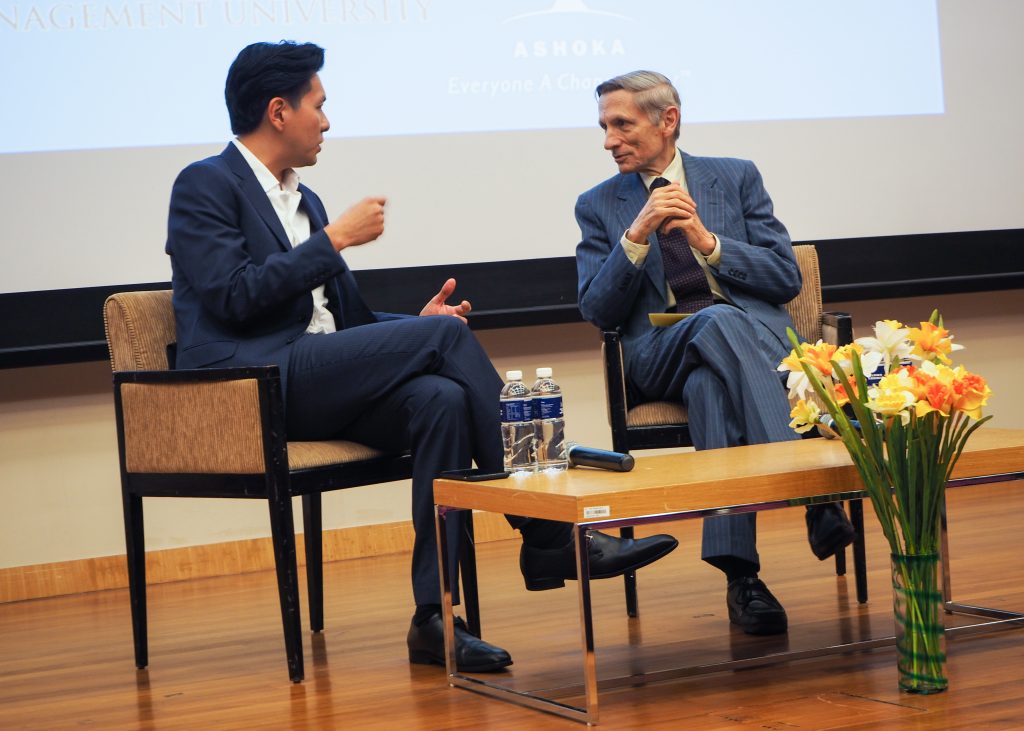By Tamara Prabhakar

Within the confines of day-to-day routines, it is often difficult to cognitively grasp the exponential rate at which the social and industrial sectors are changing. In recent years, the rising prominence of social entrepreneurship is trending as an evolved, levelling collaborative model for solving social problems more effectively than traditionally rigid hierarchical structures of management. Social entrepreneurs hold the distinct ability to innovate and form novel solutions based on their first-hand cultural knowledge and experiences rather than from popular generalised perceptions or indirect comprehension of situations from diffused information.
According to William “Bill” Drayton, an esteemed pioneer of social entrepreneurship, the key to preserving the value of social contributions in this era of rapid change is to empower and train more people at the execution level to have the ability to realise these valuable solutions for themselves. The tagline and mission of Ashoka, Drayton’s founded social enterprise, perfectly summarise this idea as “everyone a changemaker”. In other words, anyone who develops empathetic capabilities and relevant social skills can craft tailored resolutions based on their mutual understanding and investment in the challenge or issue at hand. Ashoka foremost seeks to foster and disseminate this inclusive approach through its ever growing interconnected network of international fellows serving as role models, and educational curricula aimed at instilling empathetic and changemaking practices in the rising generations.
Tell us your views on social inclusion. Do you see more “changemaking” efforts by society to become more inclusive of groups that are inherently or systematically disadvantaged?
I’m going to quote a 15-year-old young lady from Philadelphia who was at a youth venture meeting in Washington. She said, “People should understand that it is neither gender nor race, but rather if you are a changemaker that determines whether you will be a success or a failure in life.” That’s exactly it. The new division is between those people who see and play in the game of the ever-changing world, and those who don’t. Therefore, you have to be a changemaker—everyone has to be one—or you’re out of the game. There are also people who are not out of the game; however, because they don’t see the new environment and don't have the skills to play in it, we are having the world diverge at the moment.
Presently, we have fundamentalism, Trumpism and other sorts of things, because there are many people jumping off the edge and correctly feeling unwelcomed versus those who are able to play in this new game change. It is a very sophisticated interconnected world, and you need everyone to be able to see the opportunities, jump on them and come together in new teams. You get a new team if you don’t repeat for ten years; hence, it starts changing immediately, requiring a very subtle, fast-moving set of skills. So many people have no idea that this is the new game, let alone have the skills to thrive, so there is a bidding war.Salaries go up and up for the people who are good at this, and the others are just dropping off the edge. So this is the new division, and it is not getting better. Our job (as changemakers) is to ensure people are not excluded, positively meaning everyone—not just everyone in the elite—is a changemaker. We all have the power from the gift of being able to give. We can do that, and all humans become part of a brain-like structure where we are all connected to one another and constantly developing the semantic architecture to make that possible.
Alternatively, we could end up with some people playing that game and a whole bunch of other people that are out and know that they’re out.They know that we don’t want them in, and they are very angry and upset. This results in a deeply divided society, which is the recent state of affairs you can see happening everywhere. I just came from Indonesia, and its Gini coeffi cient has just gone from 30 to over 40. That’s pretty radical. Why do you think that’s been happening? The economy has been growing at a solid six per cent a year, which is much faster than population growth, and the income pattern is diverging. The same thing is happening everywhere. There are other forms of people being excluded, but this is a deep one that affects most people.
You’ve described today’s society as one based on innovation rather than repetition. Is there room for vulnerable, marginalised communities in this new landscape, and how can we move forward as a more inclusive society?
As mentioned, everyone can be a changemaker. Ashoka Fellows all across the world have demonstrated that in implementing thousands of different models with millions of people. The poorest of the poor in rural Bangladesh can, beginning in first grade, make this change and emerge in their early teens as confi dent changemakers. We are all born with these biological capacities. However, they have to be developed and practised. And they must fit into a society that welcomes and reinforces them. There is a danger that today’s vulnerable, marginalised communities will be the last to see the new game and therefore last to develop the necessary skills. If we don’t intervene actively to prevent this, we will end up with a society that is deeply divided and angry.
What role do social entrepreneurs then play in fostering greater social inclusion and how would you measure the social impact of these positive contributions?
First, when someone is a changemaker (i.e., a giver), they know that they have power. From that point on, there is no social exclusion. Every leading social entrepreneur is a role model, and the construct “social entrepreneur” empowers many people across the world to know that it is practical and honoured to care and to organise—to be a changemaker.
Second, the way social entrepreneurs spread their ideas makes them mass recruiters and facilitators of local changemakers—who, in turn, become role models and recruiters of other changemakers. The typical social entrepreneur has a small or modest-sized organisation and a huge movement of local people in community after community who recognise an idea that the entrepreneur has made simple and understandable and safe. And those people, thus encouraged, stand up to make the social entrepreneur’s idea fly in their own communities. These are the most important ways social entrepreneurs can bring about dramatically greater social inclusion. Many of them, of course, also work on it directly. For example, roughly 1,000 of the 3,800 Ashoka Fellows work with kids. A great number of them put kids in charge. In doing so, these youth are on their way to becoming changemakers, to getting their power at the most important time, their early teens.
Additionally, there are the Fellows who work against particular forms of disempowerment, such as gender or other forms of discrimination. And there are yet others who work against corruption and for human rights. Can you imagine any group that has a bigger impact on making inclusion universal?
TP: Do you think greater social inclusion is achieved at the policy level or at the individual level?
You need both! Every individual has to see and seize the new opportunities. However, we have to make sure that every young person has this opportunity, and that every parent understands what is now essential for growing up so they can be good parents. Every leader of any organisation needs to understand that they must quickly guide their group to become a fluid, open team of teams that welcomes individual changemakers. And policy must make this easy and fight against any group being left behind.
 |
Hailing from Texas, USA, Tamara Prabhakar is a rising junior at the University of Pennsylvania, with a major in Science, Technology, and Society, and double minors in Consumer Psychology and Fine Arts. Eager to gain exposure to social issues in Southeast Asia and to participate in a variety of socially oriented projects both inside and outside the classroom, Tamara joined the Lien Centre for Social Innovation as a Summer Associate (Editorial). She is also is a lead editor of IMPACT, a UPenn-based magazine with a mission to promote community involvement and effect social change on multiple scales. Tamara hopes to capitalise on the power of technology to drive and reinvent social impact in the future. She can be reached at tpra@sas.upenn.edu |








Comments